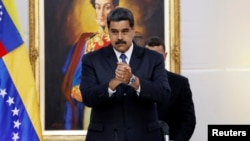Venezuela on Saturday accused the United States of using new sanctions against its government's top officials to sabotage a controversial presidential election on Sunday, which the country's opposition says has been rigged.
The U.S. ramped up pressure on President Nicolas Maduro's government on Friday, accusing him of profiting from illegal narcotics shipments and imposing sanctions against the No. 2 official in the ruling Socialist Party, Diosdado Cabello.
The United States has already imposed sanctions against Maduro for human rights abuses and blamed him for Venezuela's current economic and political crises. But Friday marked the first time that Washington publicly linked Maduro to the drug trade.
In a statement, Maduro's government called the sanctions part of "a systematic campaign of aggression" by President Donald Trump's administration and said they had no legal basis.
"It's not surprising that on the eve of a new vote, when the Venezuelan people will come out to defend their democracy against the imperialist aggressions that try to derail it, once again the U.S. regime tries to sabotage the elections," it said.
The U.S. Treasury on Friday imposed sanctions against Cabello; his wife, Marleny Josefina Contreras, who heads the country's tourism institute[ and his brother, Jose David.
Opposition challenger
Maduro is expected on Sunday to fend off a challenge from opposition candidate Henri Falcon, who is breaking the mainstream opposition coalition's boycott of the vote, which it says is rigged to assure Maduro wins a second term.
The hardline opposition party Popular Will on Saturday reiterated its call for Venezuelans to boycott the election and described it as an "electoral sham that seeks to validate the dictatorship in Venezuela and the world."
Maduro insists the election will be free and fair, and accuses the opposition of refusing to participate because it knows it cannot win.
However, his government was forced to turn to observers from allied countries to monitor Sunday's vote. It had invited the United Nations and other international bodies to send observers, but the U.N. believes the conditions do not exist to guarantee a democratic process.
The United States, Canada, the European Union and several countries in Latin America said they would not recognize the results of the polls on the ground that they are not transparent or fair.





